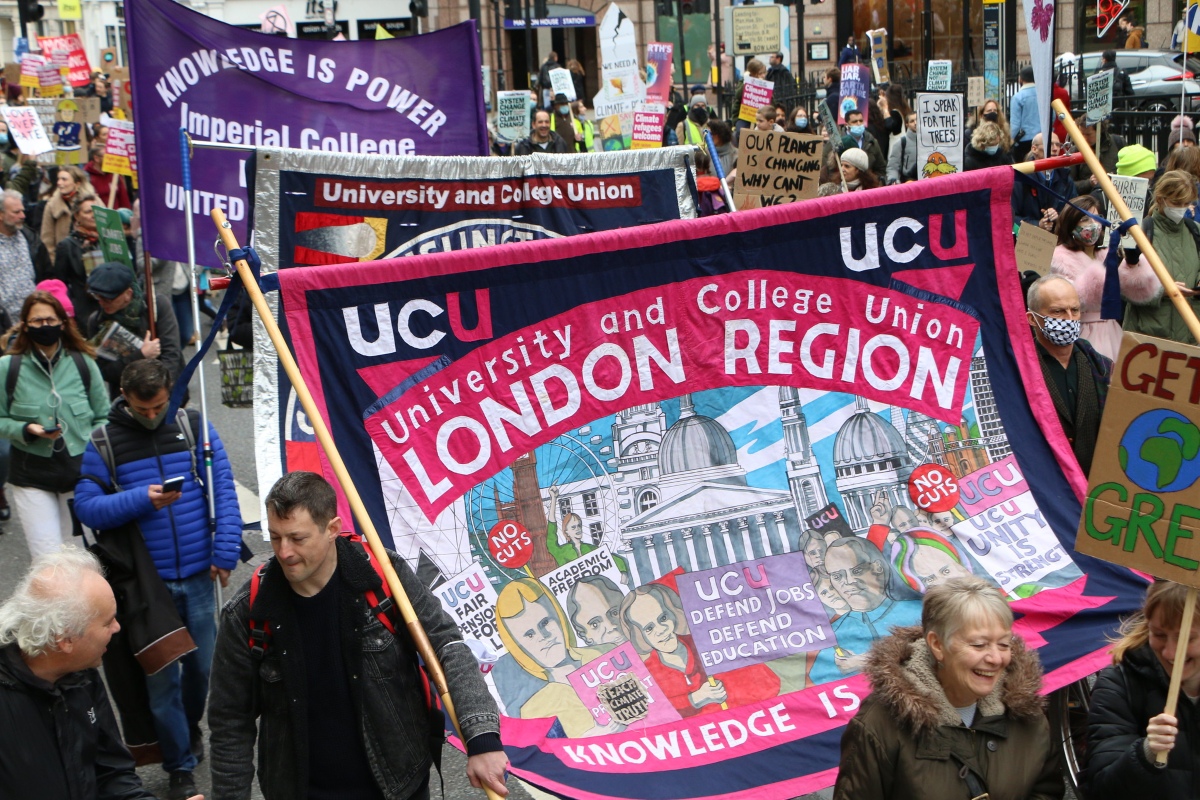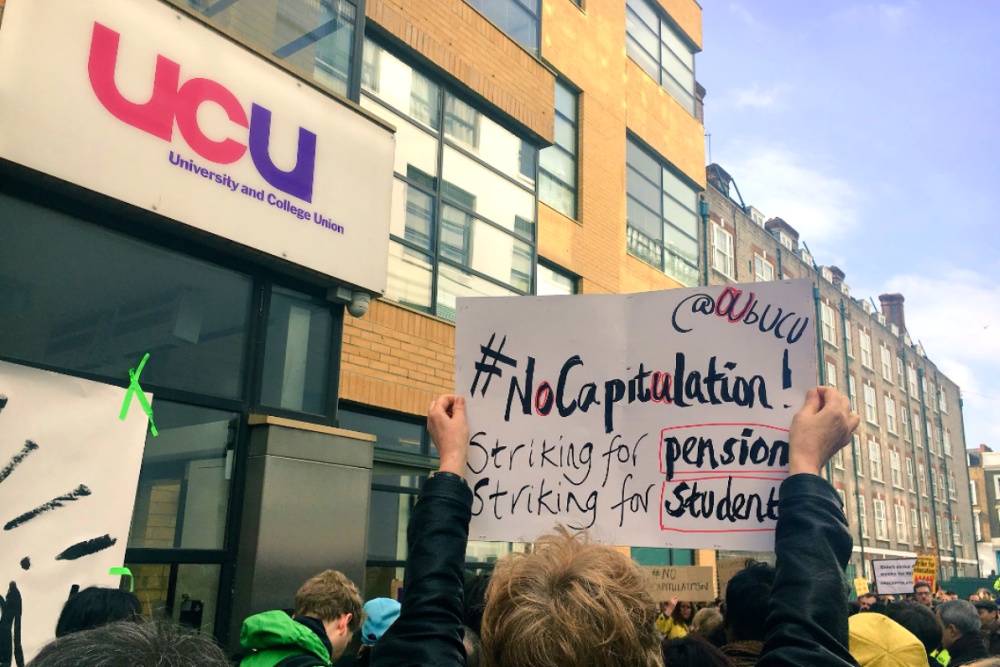The latest wave of industrial action on campuses begins today, with UCU members out on strike once again in the struggle for decent pensions, pay, and conditions. It is vital that workers and students unite and fight to defend education.
The Universities and College Union (UCU) is striking once again – this time over three weeks: 14-18 February; 21-22 February; and 28 February-2 March 2022.
UCU members are fighting against low pay, workload, casualisation, and pay inequality (known as the ‘Four Fights’), and for a decent pension.
This is taking place as workers in Britain look down the barrel of a cost-of-living catastrophe. Inflation is biting; energy costs are set to soar; and National Insurance taxes are going up.
For many university staff – as for workers across the country – this comes on top of years of low wages, precarious employment, and threats to pensions: scourges that plague the higher education sector.
The stakes are high. It is therefore vital that this latest round of UCU strikes is successful – both to score a victory for increasingly-squeezed union members; and to show other workers that militancy pays. Click here to read the UCU Marxists’ latest bulletin.
Mobilise
 Following reballots over the winter holidays, 12 more branches will be joining this latest wave of strikes, making a total of 68 branches – including some of the union’s largest.
Following reballots over the winter holidays, 12 more branches will be joining this latest wave of strikes, making a total of 68 branches – including some of the union’s largest.
Combined with the national student walkout on 2 March, the scale of action hitting higher education (HE) this term could be enormous.
With students effectively striking as well, this could significantly shift the balance of forces in our favour. Some HE Unison branches have also won local mandates for industrial action, coordinated alongside UCU.
Both of these factors provide the opportunity to shut down campuses. Members and branches must therefore maximise the mobilisation for these strikes.
View this post on Instagram
Militancy
 Our union’s current strategy has some drawbacks, however. Many members feel the action taking place this month is a repetition of past mistakes. The employers know that they can drag out negotiations until the mandate runs out.
Our union’s current strategy has some drawbacks, however. Many members feel the action taking place this month is a repetition of past mistakes. The employers know that they can drag out negotiations until the mandate runs out.
The current proposal is also to possibly reballot branches again to extend the mandate into the assessment period, if this strike action fails.
To extend the strike mandate would be a step forward. But rather than framing it in terms of a possible marking boycott, the union should firmly plan to reballot with the aim of further strike action. This would increase the pressure on the bosses.
Moreover, banking on the ‘next mandate’ without using the current one effectively does not send a message of confidence.
We support using additional tactics alongside strike action such as marking boycotts. But many employers have threatened a full deduction of pay for marking boycotts. Why should members be expected to withhold only part of their labour, if they are to be treated by university bosses as if they have withheld all of it?
10 days of action over three weeks is certainly a step forward from December’s action. But the UCU leadership should now adopt a militant strategy, with maximum immediate impact.
This means undertaking all-out, indefinite strike action, and calling on sister unions in the HE sector to organise for co-ordinated action.
View this post on Instagram
Decoupling
 The Higher Education Committee’s proposal also effectively ‘decouples’ the pensions dispute from the Four Fights.
The Higher Education Committee’s proposal also effectively ‘decouples’ the pensions dispute from the Four Fights.
Seven of the planned strike days (14-18 February and 21-22 February) have been allocated to the USS pensions dispute – the intention being to put pressure on crucial meetings with USS representatives in February. Additionally, UCU has also proposed an offer ahead of this.
Meanwhile, only five days of strike action (21-22 February, and 28 February-2 March) have been allocated to Four Fights. And the leadership has taken a tone of cautious pessimism around the issues raised in this campaign.
Deteriorating pensions and working conditions have a common cause: marketisation. But decoupling the disputes sends a message that the union prioritises pensions over working conditions.
This will lead to division in our ranks. And it ignores the desires of members, who have repeatedly voted for a united struggle.
Details of the leadership’s proposal for “rolling regional action” have also not been released. If the leadership keeps its plans secret, how are members supposed to participate in deciding the strategy?
Rather than dismissing the views of members, the union should organise the sort of rank-and-file meetings that were at the heart of the strikes in 2018. This should start at the branch level, with Emergency General Meetings to discuss and debate the way forward.
UCU Marxists therefore support the call of the CoronaContract campaign for an urgent national meeting of branch delegates, where the course of the disputes and demands could be democratically assessed, discussed, and decided.
Marketisation
UCU members are not alone. Across the education sector, workers are fighting back. With local action from Unison, the upcoming student walkout, and NEU strikes breaking out, the potential exists for sector-wide action.
As part of the upcoming national student walkout, the NUS are demanding fully-funded free education, “with proper pay, pensions and conditions for staff across education and beyond”.
This is the perfect opportunity for forging real solidarity between staff and students, uniting as one to drive back the marketisation of education and kick profits out of our campuses.
Joint action alongside students would cut across the ‘divide and rule’ tactics of university bosses, and could lead to a complete shutdown of campuses – especially if efforts are made to involve other unions in higher education.
This presents the possibility to link up and fight together. UCU should be actively pushing for such coordinated action with other education unions, locally and nationally.
After all, the marketisation of higher education hits everyone on campus: from students and security guards, to lecturers and librarians.
Brilliant first day visiting the #UCUstrikes picket line in #Lancaster. Here’s to the other 9 @LancasterUCU ✊ pic.twitter.com/hdpXJwDi0X
— Lancaster Marxists (@marxist_society) February 14, 2022
Escalation
 To realise this potential, however, the UCU must change course. This must start with rank-and-file members mobilising to defend a united struggle, and pushing for immediate escalation.
To realise this potential, however, the UCU must change course. This must start with rank-and-file members mobilising to defend a united struggle, and pushing for immediate escalation.
The determination amongst members is clearly there. With a militant programme and strategy – a battle plan for victory – we can win.
A united struggle by workers and students in education would provide an inspiring example for the rest of the trade union movement to follow.
Linked to a bold socialist programme, such a movement could deliver a knockout blow to this criminal Tory government, and offer a real way forward for workers and youth at this time of deep capitalist crisis.
- No to decoupling – for a united struggle!
- For co-ordinated action across the education sector!
- For staff-student solidarity!
- For an all-out, indefinite strike to defeat marketisation!




0 Comments